While 88% of all online reviews come from four leading websites, there is still free room for new and promising social projects of this type. The matter is that people love sharing their experiences (especially negative) and 70% of online shoppers read up to six independent reviews before making a purchasing decision.
So, how can you create your own review website and compete with globally leading platforms? This article suggests a review website development strategy along with some insightful ideas to create a competitive edge.
What’s The Main Idea of Review Websites and Why Are They Relevant?
The main idea of review websites is more than simple – these are the platforms that allow the buyers and customers to share their experiences and impressions of products and services they recently purchased and ordered. But despite the simple idea behind it, review websites have long become powerful marketing tools that are equally beneficial for both companies and customers.
Below are just some of their advantages.
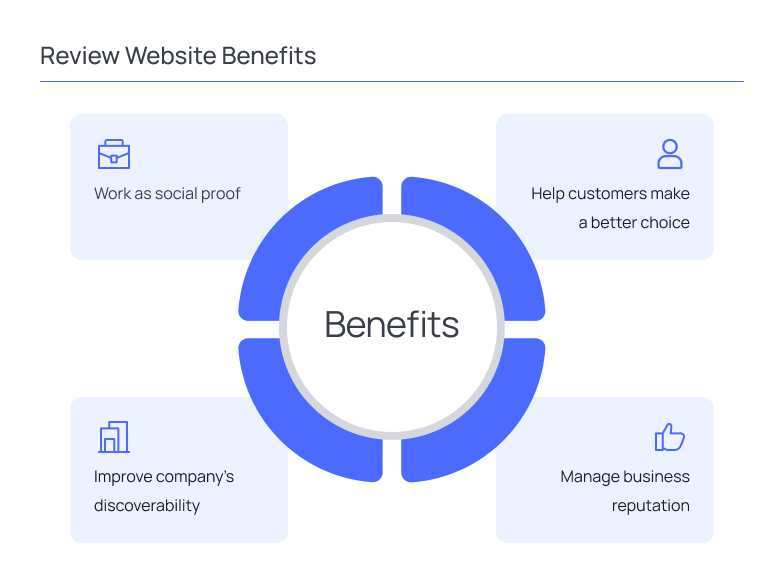
- Work as social proof. 88% of customers trust users’ online reviews as much as personal recommendations. However, most of them agree that for such a trust level, there should be multiple reviews for a product or service, and all of them should look authentic.
- Help customers make better decisions. For 25% of US customers, online reviews are important to consider before choosing an online retailer. 62% of them also research customers’ feedback before picking a service provider.
- Improve the company’s discoverability. For example, on Yelp, the companies and establishments with the highest user rating are highlighted in the organic search results more frequently compared to the ones with poor customer feedback.
- Work as a business reputation management tool. Online reviews shared by the users are the tools that can both skyrocket and significantly damage your reputation. From this point of view, review websites become strong reputation management tools, which, when used right, can influence customers’ decisions, improve your brand awareness and shorten the sales cycle. For instance, 42% of Yelp visitors make a purchase within a day after visiting the website.
How Review Websites Make Money with Examples
While review websites are free for users eager to share their feedback, there are several opportunities to monetize such projects. Below are the most viable business models for a review application.
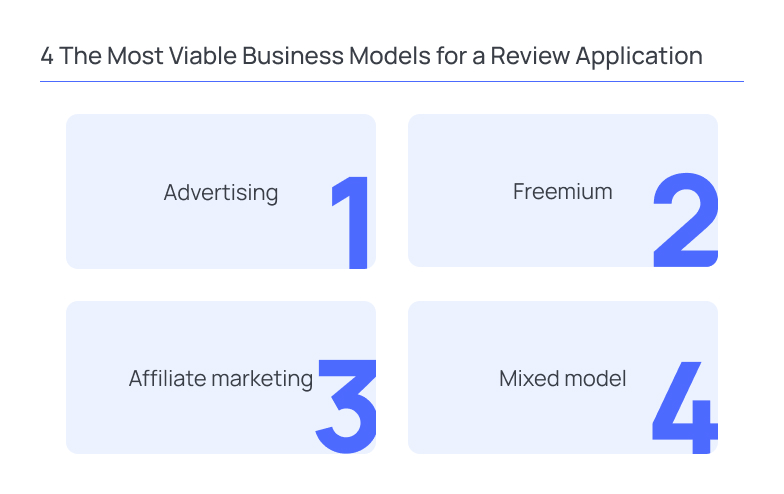
- Advertising. This is the most intuitive tactic to follow, especially at the very beginning of the project’s lifecycle.
- Freemium. This business model implies offering corporate customers some free features, for example, creating a business profile on a website and communicating to the users who left a review. More advanced features, for example, a top place in the listing or running PPC advertising across the review website, come for a fee.
- Affiliate marketing. A lot of review websites also make use of affiliate marketing, earning a commission each time the user follows a company’s link and makes a purchase on a business website. For example, TripAdvisor partners with hotels across the globe in this way.
- Mixed model. A mixed model, as the name suggests, means combining the best features from the monetization tactics above into a holistic strategy. For example, Yelp is great at following a mixed business model and offering companies the smartest set of services within the platform. For instance, their Upgrade package (inspired by the Freemium business model) allows the companies to stand out in search results, convert visitors into customers with customized calls-to-action and block the competitor’s ads on your page.
Need help with choosing the right business model for your future project? Apply for Business Support services and play it right!
Apply for Business Support servicesHow to Build a Review Website Step by Step
So, let’s find out how to create a review website following the LEAN development methodology and staying agile.
1. Decide on a review website type
Before starting a review website, the first thing is to decide on its type. Below are the ones to choose from.
- Websites with user-generated reviews. For example, these are such projects as Yelp and TrustPilot.
- Websites with expert and critical reviews. TrustRadius and Clutch.co can be some of the examples of review websites of this type since the reviews they have are shared by business and tech professionals.
- Independent review blogs. For instance, Healthline is an independent health and wellness blog that also has a “Shop” section with product overviews, comparisons and expert reviews.
Websites for which reviews are not the primary business. Reviews aren’t a primary business for Google, however, most users searching for a local business pay attention to them.
2. Decide on a niche
The next step to create a review website is to decide on a niche. The choice of possible ones is pretty large, so below are just some of the ideas.
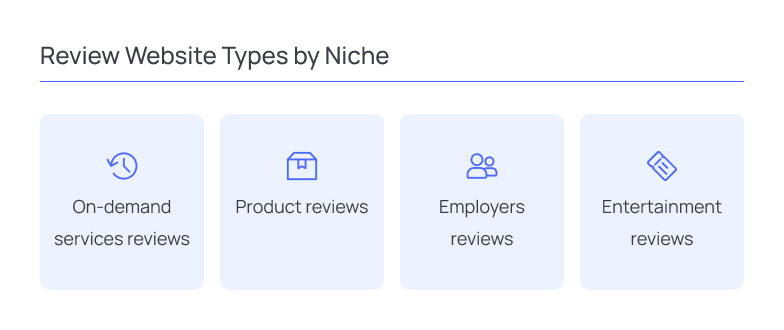
- On-demand services reviews. If you would like to make a review website for such a niche, you have to be very smart and creative. There are two possible tactics to compete with Yelp – you have to either narrow the niche down even more, create a website for food delivery or taxi services reviews only, or leverage the most innovative solutions like AI or VR. Also, think about the ways to create a niche review website for a less popular niche – for example, the competition in the healthcare services review niche isn’t as fierce as in food delivery.
- Product reviews. Let us guess that the first website you visit for product reviews is Amazon. While it isn’t a review website in its pure form, its review feature is pretty useful for both Amazon users and occasional visitors.
- Employers reviews. In one of our recent articles, we discussed how to make a job posting website like Glassdoor. You have probably noticed that in addition to job ads, it is also an employers’ brand management website where ex-employees can share their impressions on collaboration with a particular company.
Entertainment reviews. This is also a pretty wide niche that can cover the websites with online games, movies, dating services, events reviews and so on.
3. Think over a business model
The choice of a business model directly depends on the niche you choose to build a review website for. For example, monetizing a product reviews website with affiliate marketing makes the most sense. This strategy can also work for an expert blog with a product review section. An entertainment reviews website can easily be monetized with the help of advertising, while the platform reviewing on-demand services requires following a mixed tactic.
4. Shortlist the necessary features for an MVP
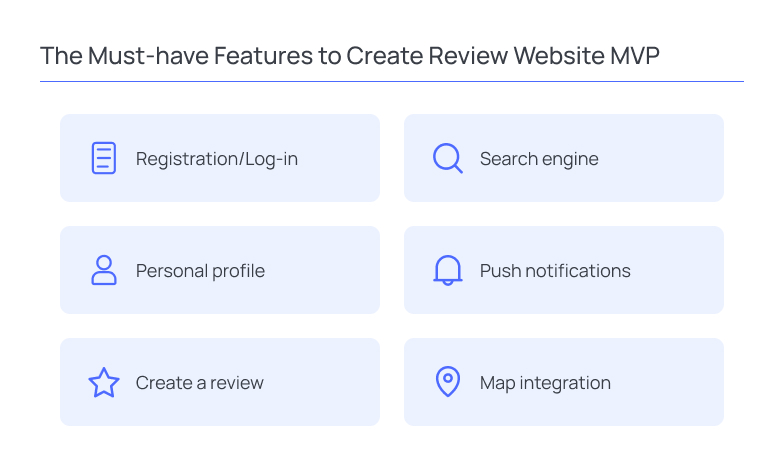
Below are the must-have features to create review website MVP and get started with gathering user feedback.
- Registration/Log-in. As usual, don’t forget to add the opportunities to log in via Google and social media.
- Personal profile. Depending on the specifics of your review website, you will probably have to create two different profiles – for customers and for businesses. The latter requires thinking over more details like payment system integration, communication with the customers, setting up advertising campaigns, reports and analytics and so on.
- Create a review. This is a core feature for a review website. In addition to text review, there also should be an option to add photo and video feedback.
- Search engine. After logging in, a search engine is the next getting-started feature for most users. Adding local search features would also be essential for the websites sharing local business reviews.
- Push notifications. Push notifications are still great for user engagement so consider creating flexible notification settings to deliver a better-personalized experience.
- Map integration. Don’t forget to integrate your website with a map service so that the users can also look for the best-rated establishments in this way.
Making a Review Website Competitive - Ideas for Inspiration
After we have discovered how to start a review website, let’s find out how to make it competitive and trusted by users. Below are some simple yet effective tips.
- Accept reviews from only verified buyers/customers. For example, TopHotels, one of the main competitors of TripAdvisor, encourages travellers to add their travel vouchers when writing a hotel review to make the latter more credible. Given that 30% of online reviews are fake, verifying user feedback in such a way makes a lot of sense for a newly created startup.
- Embed an AI-powered review verification algorithm. A fake review spotting algorithm is another tool to clear your website from them and make it more trustworthy. For example, you can do it with the help of Fake Spot API.
- Add a location spotting feature. As for another idea for making the reviews on your website more credible, consider adding a location spotting feature. With its help, the users would be able to check-in in an establishment and leave an authentic review here and now.
- Add a one-tap review feature. An opportunity to leave a one-tap review is great for both users who don’t want to write a text, plus they can be used to rate products or services, making them compete more honestly.
- Add gamification experience. For example, Yelp has some gamification features, plus it allows for community building. The most active users can receive points and become Elite reviewers on the platform.
- Embed a recommendation engine for a better-personalized experience. Doing it with the help of a recommendation engine API is pretty easy.
- Let the companies communicate to the reviewers via your platform. Both businesses and customers will appreciate such a reputation management feature. The latter, by the way, expect businesses to respond to their review in less than a week.
Ready to create an innovative review website? Meet our programmers right now for more insights and ideas!
Meet our programmersWhat Technologies to Choose for Review Website Development?
So, let’s proceed with the technical side of the question. How to make a review website when the choice of technologies, tools and frameworks is so diverse? Consider some of the intuitive options below.
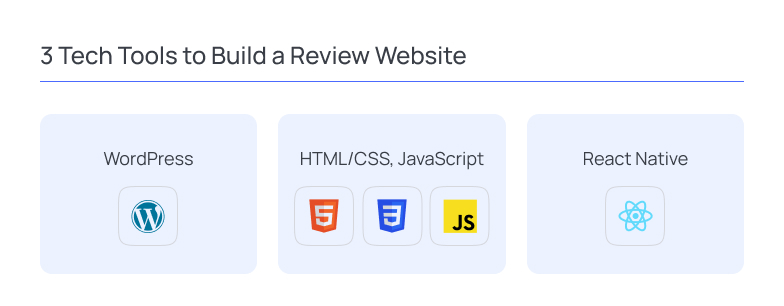
- WordPress. Using a pre-developed WP theme for a review website is the easiest way to choose. However, keep in mind that while this option is the most cost-effective, the customization opportunities are pretty limited in WordPress. Nevertheless, this platform can be a good choice for idea validation at a low cost and almost no time.
- HTML/CSS, JavaScript. This tech stack, in turn, allows for developing a more professional review website with a fully-custom design and unlimited customization potential. In such a case, you will have to hire JavaScript developers to leverage the full power of this technology and make your future website secure and scalable.
- React Native. React Native is a cross-platform development technology that makes sense if your target users expect mobile experience to come first. React Native websites seamlessly adjust their UI according to the operating system, browser and device they are accessed from. From this perspective, this technology can be a good choice for low-cost idea validation if in future you plan to develop a review-sharing mobile application.
Get Started with a Top-Notch Review Website Development Right Now
So, creating a review website can be a promising idea for a startup but you have to think over your value proposition carefully, keeping market trends and user expectations in mind. Also, consider hiring Ukrainian developers for startups to access top tech expertise and build your project at a reasonable cost.
Binerals programming team is here to get started with your review website development right now. Send us a quick note to make your project run!
Send us a quick noteFAQ
What are review websites?
Review websites are the platforms that allow users to share their experiences and impressions of recently bought or ordered products or services. With the help of review websites, prospective customers can make better purchasing decisions, being guided by social proof, while businesses can use them as social listening and reputation management tools.Which review website is the best?
Yelp is one of the best websites that review services and establishments. When it comes to product reviews, Amazon can be used as a review website as well. There are also niche review websites like TrustRadius (for software solutions reviews) or Clutch.co (for ICT companies reviews).How to choose the right technology to build a review website?
The choice of the tech stack to build a review website largely depends on the project specifics, goals and budget. For example, using WordPress is the easiest and the most cost-effective option to get started with such an app. JavaScript, in turn, opens up more opportunities to make your review website designed in a custom way. React Native, for instance, allows for building a cross-platform review application that will work equally well across browsers and devices.Where to look for the top-skilled programmers to help me with a review website development?
You are at the right place to hire top-notch developers who will be happy to help you with a review website development. We, at Binerals, have hands-on experience with social project creation and can share our insights and best development practices right now.How much does it cost to create a review website?
The cost to build such a platform depends on the tech stack you choose. For instance, building it with WordPress on your own is the cheapest option. However, if you want to add a more professional look to your review website, and still create it at a reasonable cost, consider hiring software developers from Ukraine and choosing more advanced tools and frameworks.